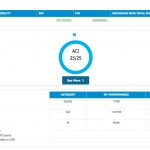RISE now has three means of reporting through the Merit-Based Incentive Payment System (MIPS): individual, group and the recently added virtual groups. According to the CMS, virtual groups allow individual MIPS-eligible clinicians or groups consisting of not more than 10 MIPS-eligible clinicians to join together and report as if they were a single entity. The virtual group may be based on appropriate classifications of providers, such as by geographic areas or by provider specialties (rheumatology) defined by nationally recognized specialty boards of certification or equivalent boards.
Small Practices Reap Rewards
If yours is a small practice, a virtual group can prove beneficial when you are reporting for MIPS in 2018. Similar to the group practice reporting option (GPRO), virtual groups can allow providers to combine their patient populations, which can allow different providers to specialize in quality-improvement initiatives that are most meaningful to them. Unlike individual reporting, where a single provider has to meet all the requirements of the Quality Payment Program by themselves, a virtual group disperses the responsibility among multiple providers.
Where to Start
The CMS has extended the deadline for solo and small-group practices to participate as virtual groups to Dec. 31. This means solo physicians or group practices with 10 or fewer clinicians who are eligible participants in MIPS and want to form a virtual group for 2018 must act quickly. A good first step for physicians interested in the virtual group option: Download the CMS’s virtual groups toolkit (www.cms.gov). Three documents are included in the kit: a virtual group agreement checklist, an agreement template and details about the election process.
Physicians can go to the CMS Physician Compare website to see whether a colleague is using an electronic health record and whether he or she has participated in quality reporting. If you have not already established your group, this will essentially give you a first-step process of who to contact and discuss the possibility of a virtual group with.
The CMS clarified that each virtual group must have a formal written agreement among all group members, as well as information about each taxpayer identification number and national provider identifier associated with the virtual group.
For more information or help, email ACR registry staff at [email protected].


